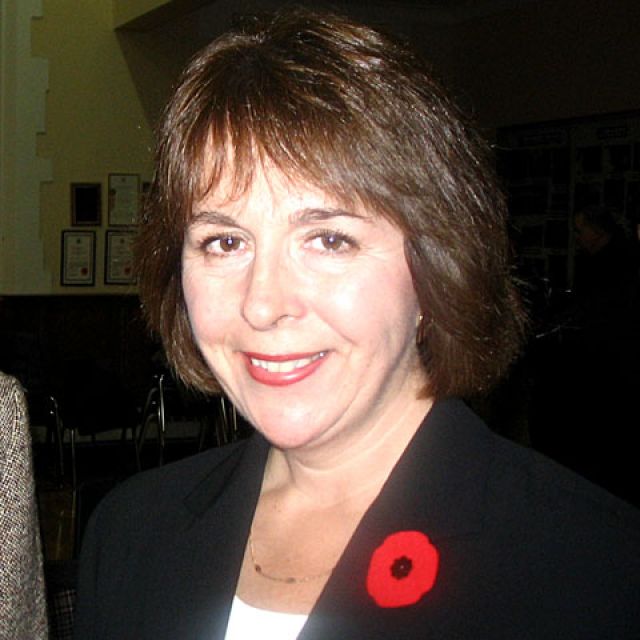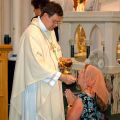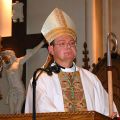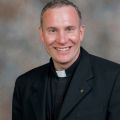News/Canada
Lawsuit aims to end Lord's Prayer at Grey County council meetings
By Michael Swan, The Catholic RegisterAtheists are taking Ontario's Grey County to court to force county council to stop praying the Our Father at the start of meetings.
Peter Ferguson of Kimberly, Ont. — one of nine municipalities in the county on the shores of Georgian Bay — served legal papers on the county July 30 alleging the practice of reciting a Christian prayer at the beginning of a government meeting is illegal. In 1999 the Ontario Court of Appeal ruled that Penetanguishine, Ont., was violating constitutional guarantees of freedom of religion under the Charter of Rights and Freedoms by starting council meetings with The Lord's Prayer.
Ferguson is seeking an end to the practice along with $5,000 in damages.
As far as Catholic Civil Rights League executive director Joanne McGarry is concerned, going to court over prayer is just sad.
"I always find it very distasteful or off-putting when prayer turns into something people are just battling about," she said.
Ferguson's court case is backed by Secular Ontario, an offshoot of the Humanist Association founded in 2005 with about 20 members.
Secular Ontario president Sheila Ayala told The Catholic Register an important principle is at stake in the case.
"Council meetings are open to the public. It's important that everybody is included," she said. "The principle is that we all pay taxes to where we live. We ought to be included but we're being excluded."
No disrespect is being aimed at the traditions of Ontario or religious conviction of three-quarters of Ontarians who align themselves with Christian faith, said Ayala.
"We're not stopping anybody from going to their synagogue or their mosque or whatever. We're not saying you can't practise whatever religion you want."
But Ayala does believe expressions of religious faith have no place in the public sphere.
Secular Ontario has sent letters to about 28 municipalities where reciting the Our Father at council meetings persists, said Ayala.
"We're having to take them to court again. They're not complying with what in fact is the law. They are breaking the law," she said.
"Court challenges of this kind are unfortunate. It just causes a lot of grief to people that we don't really need to have," said McGarry.
McGarry supports councils that wish to pray at the start of their meetings.
"It's like grace before meals," she said. If there's a need to be more inclusive, then rotate the prayers among the faith traditions of the community, she said.
"One week it might be Christian and the next week Muslim and the following week it could be more secular, a moment of reflection," McGarry said.
When the issue came up at the Ontario Legislature in 2008, Toronto's Cardinal (then Archbishop) Thomas Collins argued against a simplistic, ahistorical interpretation of the word secular.
"It is important not to be befuddled by a distorted view of the secular, one which holds that all life in the public realm must be meticulously sterilized lest a hint of faith intrude," he told legislators.
Collins was not against non-Christian prayers being used to open public debates, but argued tradition and the large Christian majority ought to assure the Our Father remains.
"It is highly appropriate that the deliberations of those whom we elect as our representatives should begin with prayer," he said. "Religion is not alien or dangerous. It is fruitful and life-giving and any effort to eliminate evidence of it in public assemblies is misguided... The Lord's Prayer has the advantage that it is part of our historical tradition, it is a contribution from the spiritual heritage of almost three-quarters of our citizens and it is at the same time open to wider application by any people of faith, and in fact by anyone."
Bishop Kirkpatrick comes to Toronto
By Vanessa Santilli-Raimondo, The Catholic RegisterTORONTO - On the feast day of Jesus' grandparents, a eucharistic celebration in honour of new Bishop Wayne Kirkpatrick was held at St. Michael's Cathedral July 26, where his own grandparents were married about 100 years ago.
Chalice again among Canada’s top charities
By Erin Morawetz, The Catholic RegisterFor the third straight year, Chalice, a Catholic charity based in Nova Scotia, has been awarded an overall “A” rating by MoneySense magazine in its “Charity 100” list.
The Canadian business magazine annually publishes its ratings of the biggest 100 charities in Canada based on four categories — charity efficiency, fundraising efficiency, governance and transparency and reserve fund size. And each year, Chalice, primarily a sponsorship program between Canadians and children in developing nations that also runs mission trips and raises money for disaster relief, has received top marks.
For Chalice marketing manager Sehne Connell, the rating means the world.
“We look forward to this magazine and we really hope that we continue with our A rating,” Connell said. “It’s really, really important to us because it confirms to our existing sponsors and donors that they are part of an organization that can be trusted with their donations.”
It’s also an extra marketing boost that makes a difference to this small charity, which relies primarily on word of mouth.
“It allows others to get to know who we are,” Connell said. “We don’t spend a lot of money on … advertising. We rely on people to spread the word and let others know about Chalice.”
Connell said the main reason Chalice is so tight with its advertising budget is because of the “golden ratio” — that is, sending 92-93 per cent of all donations overseas, to the children.
“Every decision we make and expense we have to incur, we make sure upfront that we are going to be able to send (that percentage of) money to the children,” he said.
It’s also why, according to Connell, the charity only received a B rating in the “reserve fund size” category.
“We just don’t believe that we should keep money back and have a big reserve,” Connell explained. “The money we do have — four months reserve — is where we want to keep it.”
But the B rating in the “governance and transparency” section is something Connell says Chalice will be working on.
“We need to look at improvement. We’re not showing enough (financial information) on our web site,” he said. “We just need to get up there. That’s not something we would ever hide. It’s open to anybody.”
In the other two categories, “charity efficiency” and “fundraising efficiency,” Chalice received two A+ grades. In the section of International Aid and Development charities, in which Chalice fit, the only other organizations to receive an overall A rating were Free the Children and Compassion Canada, another sponsorship program.
For Connell, it’s not just about awareness, but also acknowledgment of hard work.
“We love the work that we do and we get to see the results in the field and the difference that it makes,” he said.
“It’s rewarding to see that you get recognition.”
D&P coming to grips with austerity
By Michael Swan, The Catholic RegisterThe Canadian Catholic Organization for Development and Peace is hiring, but by the time the new employees are at their desks the Catholic aid agency will have reduced its full-time staff by 15 per cent.
Staff reductions became inevitable this spring when the Canadian International Development Agency reduced funding to D&P by more than $30 million over the next five years.
The six job openings — two full-time permanent positions and four part-time contract jobs — are filling vacancies that have come up over the last year from retirements, expired contracts and voluntary resignations, said executive director Michael Casey. D&P had frozen all hiring over the last year while awaiting a funding decision from the government.
After two years working with CIDA officials on a plan for continued development work in Africa, Asia and Latin America, then CIDA Minister Bev Oda announced in March her government would extend funding to select projects in just seven countries, leaving most of the 186 projects D&P runs in 30 countries unfunded.
In June D&P’s national council approved a restructuring plan that will reduce staffing 15 per cent by Sept. 1. The plan reduces its budget by $5 million this year.
But the Canadian partner in the international Caritas network is also planning for a future with less government support. The organization is shifting resources into fundraising and outreach in what some are calling a “re-launch.”
“The restructuring plan was developed following an extensive consultation process with our membership and staff over the past year as the organization adapts to new challenges in our external environment, most notably the significant reduction in government financial support for our international programs,” wrote Casey in an e-mail to The Catholic Register.
The new positions are posted at www.devp.org and in this edition of The Catholic Register.
Cancer prevention on minds of Ontario CWL
By Erin Morawetz, The Catholic RegisterOntario's Catholic Women's League has put its support behind infrared breast screening thermography while expressing opposition to youth indoor tanning.
These resolutions were passed at the 65th annual Ontario provincial convention of the CWL, which took place in Kingston, Ont., July 9 to 11.
Marlene Pavletic, president of the provincial council, told The Catholic Register that each of the resolutions passed with little debate.
“What we try to do is focus on the actual material, ensuring that we’ve got good Canadian material (that’s) current,” Pavletic said. “We’ve gone in depth to make sure our briefs are solid.”
The first resolution, prepared by the St. Catharine’s Diocesan Council, looks at infrared breast screening thermography as an alternative to mammograms.
“There is a concern about the extra radiation that women are getting from mammograms, and thermography doesn’t have any radiation,” Pavletic explained.
This cancer detection treatment has not been approved in Ontario, but the council will now be insisting the Ontario Ministry of Health take another look.
“We would like them to re-do some studies on it with the modern technology of thermography,” Pavletic said.
For the second resolution, which was prepared by the Kingston council, the provincial council is joining many other advocacy groups pressing the government to prohibit the use of indoor tanning equipment by youth.
“It’s a public health issue,” Pavletic said. “Our concern is that melanoma is one of the most serious cancers and the most common types of cancers.
“We thought that if we could urge the government to prohibit the use of it before the age of 18, that might perhaps decrease the incidence of it.”
Local MPP John Gerretsen was on hand to address the delegates at the opening ceremony. He said efforts like those of the Ontario CWL will slowly but surely make a difference.
“I urged them to continue advocating,” he said. “One of the things that they’ve done over the last two or three years is have information sessions at Queen’s Park with members of all political parties, and I urged them to continue with that.”
Bishop Kirkpatrick joins Toronto archdiocese
By Vanessa Santilli-Raimondo, The Catholic RegisterST. CATHARINES, ONT. — During Bishop Wayne Kirkpatrick's July 25 ordination, significant figures in his life raced through his mind.
"I was thinking of my parents," he told The Catholic Register, after becoming the newest auxiliary bishop of the archdiocese of Toronto. "I was thinking of Bishop Thomas Fulton who ordained me."
He was also thinking about the years he spent at the Cathedral of St. Catherine of Alexandria in St. Catharines, where the ordination took place.
"I've been here for 14 years altogether and I was ordained here."
Kirkpatrick said his new ministry is going to be a greater responsibility.
"Definitely in the laying on of hands, I could feel that responsibility coming upon me."
Born in St. Catharines on June 5, 1957, Kirkpatrick studied at St. Jerome's College at the University of Waterloo, earning a bachelor of arts in philosophy before entering St. Augustine's Seminary in 1980 where he completed a masters of divinity before being ordained to the priesthood in 1984. He also studied at Saint Paul University in Ottawa, where he earned a Licentiate (masters) of canon law in 1990.
The move to the archdiocese of Toronto is going to be difficult, Kirkpatrick acknowledged.
"It's always difficult to uproot but I think life is a series of uprootings," said Kirkpatrick. "This is a big one but certainly one that with the prayers and support of the people of St. Catharines and Toronto, I'll be able to make that."
As auxiliary bishop, Kirkpatrick will oversee care of the pastoral needs of the northern pastoral region of the archdiocese of Toronto. He has also been appointed as episcopal vicar for religious institutes of men and women in the archdiocese and episcopal vicar for the francophone community. As well, he is now titular bishop of Aradi.
St. Catharines' Bishop Gerard Bergie called the ceremony both beautiful and moving.
"I can't help but feel pride, not a sinful pride, but pride in that the diocese has provided a wonderful ceremony and provided a wonderful priest to the archdiocese of Toronto," said Bergie.
Kirkpatrick will be greatly missed, said Bergie, who has worked with the new bishop since arriving in the diocese in November 2010.
"We started in the seminary together so I've known him for many years. When I was new to the diocese, he was a great help to me and always there for me, very supportive, very knowledgable, so I'll always be indebted.
"Truly, Toronto's gain is our loss," he added.
Laurier LePage, a senior server at the Cathedral for the past 28 years, grew up in the same area in St. Catharines as Kirkpatrick and the two were schoolmates.
"As he became a priest in St. Catharines, I started to see him again… I was glad to see him come back. It was great. It was like old times together again."
Deborah LePage, Laurier's wife, lived two houses down from the Kirkpatricks.
"From seeing him play cowboys and Indians in the backyard, then to a priest, then to a monsignor and now, this is unreal. It's really unreal.
"It just makes my heart throb," she said. "I was in tears."
Thomas Brown, 40, a parishioner at the Cathedral of St. Catherine of Alexandria, has known Kirkpatrick for about 15 years.
"I'm just so happy for him to become a bishop," he said, adding that he'll miss him very much.
During the homily, Cardinal Thomas Collins said people's lives are touched by the ministry of an apostle of the Lord.
"As bishops, we need to work hard to be spiritually fruitful," he told the packed cathedral.
Mentioning courageous saints such as Francis de Sales, Charles Borromeo and John Fisher, Collins described various challenges they faced such as evangelizing a society that had fallen away from the faith.
"The challenge is great but we have mighty heroes," he said.
The episcopal motto chosen by Kirkpatrick is "Abide in me," said Collins.
"And these words guide all of us as disciples," he said.
After the ordination, Kirkpatrick was absorbing the events of the day, which took place on the feast of St. James.
"I'm the kind of person that reflects upon all that's taken place so as the day wears on and tomorrow I'll be thinking more about what's taken place."
Investiture with ring, miter and pastoral staff
The Ring
The first insignia to be received by the bishop during the rites of ordination is the ring. Upon handing over to the newly ordained bishop the ring, the principal ordaining bishop says, "Take this ring, the seal of your fidelity. With faith and love, protect the bride of God, His holy Church." The ring symbolizes discretion, since rings were used to seal private documents and the ring represents the symbolic marriage between the bishop and the Church.
The Miter
The next insignia which is given to the newly ordained bishop during the rites of ordination is the miter. The miter is a headdress which points upwards towards heaven. It is a mark of the bishops' office and a symbol of their authority.
The Crozier (also called the pastoral staff)
The last symbol given to the newly ordained bishop is the crozier. The principal ordaining bishop says, "Take this staff as a sign of your pastoral office: Keep watch over the whole flock in which the Holy Spirit has appointed you to shepherd the Church of God." Each bishop is a symbol of Christ the Good Shepherd. The crozier also symbolizes the responsibility that the bishop has in leading all to Christ.
D&P extends African aid
By Catholic Register StaffThe Canadian Catholic Organization for Development and Peace is expanding its commitment to 18 million west Africans in the Sahel region threatened with starvation.
The Catholic aid and development agency is working with Caritas Internationalis to launch food and seed distribution projects in Mauritania, Chad and Senegal to reach 300,000 people. The new projects are in addition to programs for 19,500 households in Niger, Mali and Burkina Faso. D&P is funding the Niger, Mali and Burkina Faso program along with Canadian Foodgrains Bank.
Appointment of Canadian bishops continues despite summer doldrums
By Deborah Gyapong, Canadian Catholic NewsOTTAWA - The Holy Father may have moved to his summer residence at Castel Gandolfo, but that has not stopped announcements of new episcopal appointments as the Catholic Church in Canada enjoys the dog days of summer.
On July 16, the Pope also accepted the resignation of Keewatin-Le Pas Archbishop Sylvain Lavoie and appointed Fr. William Stang as apostolic administrator. Stang has been serving as vicar general and chancellor of Keewatin-Le Pas and confirmed that health reasons are the reason behind Lavoie's resignation.
Kingston MPP John Gerretsen walks a mile in poor’s shoes
By Erin Morawetz, The Catholic RegisterThe Sisters of Providence in Kingston, Ont., are hopeful there may be more “food in the budget” some day soon after a positive response from local MPP and Attorney General John Gerretsen to an organized “food tour” of the eastern Ontario city.
Tara Kainer, social justice advocate with the Sisters of Providence, planned the event for the MPP for Kingston and the Islands so Gerretsen could “spend a few hours in the shoes of someone on social assistance, to see what it’s like.”
Assumption fundraising board resigns amidst financial questions
By Ron Stang, Catholic Register SpecialWINDSOR, ONT. - The diocese of London will conduct a financial audit of the work of a private company that spearheaded a 10-year national fundraising campaign to renovate this city’s historic Our Lady of Assumption Church.
The church dates from 1847 and belongs to the oldest parish in Canada west of Montreal. But severe deterioration required extensive repairs to various structural parts of the church including the roof, walls and electrical system.
Federal government appeals B.C. decision striking down euthanasia laws
By Deborah Gyapong, Canadian Catholic NewsOTTAWA- The federal government has announced it will appeal the June 15 British Columbia Supreme Court Carter decision that struck down Canada's laws against euthanasia and assisted suicide.
"After careful consideration of the legal merits," the Government of Canada will appeal the Carter decision to the British Columbia Court of Appeal and seek "a stay of all aspects of the lower court decision," said Justice Minister and Attorney General Rob Nicholson in a July 13 statement, released on a Friday afternoon shortly before the July 16 deadline for filing an appeal.











